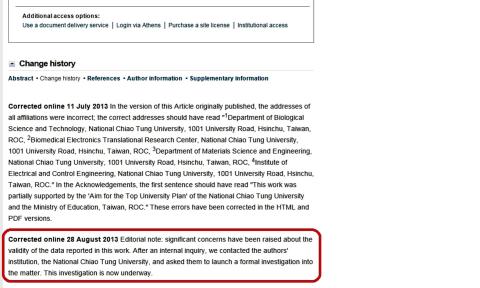The Ministry of Science and Technology yesterday said that leading international scientific journal Nature Nanotechnology has decided to retract from its Web site an article penned by National Chiao Tung University professor Steven Huang (黃國華) and his student Chen Yu-hsiun (陳昱勳) on DNA polymerase genome sequencing over doubts from international academic circles about the validity of the pair’s research.
Deputy Minister of Science and Technology Lin Yi-bing (林一平) said the ministry earlier this week received an e-mail from the journal’s staff about the decision.
He said that an ad hoc task force at the ministry probing the case deemed the research “highly likely to be forged” and has made a suggestion to the ministry’s academic ethics committee to punish Huang and Chen, asking that the pair’s right to apply for any further project overseen by the ministry be suspended for 10 years and five years respectively.

Screen grab from Nature Nanotechnology Web site
“Huang and Chen were unable to replicate the results of their project and failed to present the tools they claimed to use,” Lin said.
Arrangements are being made for the committee to convene, and the pulling of the pair’s article would greatly influence the verdict; however, it is still premature for any conclusions to be made, he said.
Huang and Chen last year submitted the writing on their research, which Huang claimed would greatly speed up the process of virus genome sequencing — from at least one day for every virus to one hour — thus significantly reducing the time and cost required for developing new vaccines and antivirals.
Huang said that his method was “more affordable, accurate and faster” compared with traditional means.
However, since the duo’s research was published by the journal in May last year, academics worldwide have called into question its methodology and legitimacy, saying that its results were “too perfect.”
“The data looks so good that others are wondering whether [the] researchers had help from God. If not, their paper would be worthy of Nobel Prizes from all branches of science. Strangely none of those critical breakthroughs are described in the paper,” said an unnamed contributor on online bioinformatics blog Homolog.us.
Other critics of the allegedly forged research include US scientist Stuart Lindsay, a professor of single molecule biophysics at Arizona State University, who questioned the “superconducting materials” the duo claimed to use to simulate the qualities of DNA polymerases — enzymes in human cells that are essential for DNA replication — saying: “None of us know of a superconducting material that works at the same temperature as a polymerase.”
Superconductors work at temperatures well below freezing, with even superconductors that operate at higher temperatures only beginning to react at about -135?C, while polymerases generally operate at about room temperature, he said.
Huang and Chen could not be reached for comment.

CHAOS: Iranians took to the streets playing celebratory music after reports of Khamenei’s death on Saturday, while mourners also gathered in Tehran yesterday Iranian Supreme Leader Ayatollah Ali Khamenei was killed in a major attack on Iran launched by Israel and the US, throwing the future of the Islamic republic into doubt and raising the risk of regional instability. Iranian state television and the state-run IRNA news agency announced the 86-year-old’s death early yesterday. US President Donald Trump said it gave Iranians their “greatest chance” to “take back” their country. The announcements came after a joint US and Israeli aerial bombardment that targeted Iranian military and governmental sites. Trump said the “heavy and pinpoint bombing” would continue through the week or as long

TRUST: The KMT said it respected the US’ timing and considerations, and hoped it would continue to honor its commitments to helping Taiwan bolster its defenses and deterrence US President Donald Trump is delaying a multibillion-dollar arms sale to Taiwan to ensure his visit to Beijing is successful, a New York Times report said. The weapons sales package has stalled in the US Department of State, the report said, citing US officials it did not identify. The White House has told agencies not to push forward ahead of Trump’s meeting with Chinese President Xi Jinping (習近平), it said. The two last month held a phone call to discuss trade and geopolitical flashpoints ahead of the summit. Xi raised the Taiwan issue and urged the US to handle arms sales to

State-run CPC Corp, Taiwan (CPC, 台灣中油) yesterday said that it had confirmed on Saturday night with its liquefied natural gas (LNG) and crude oil suppliers that shipments are proceeding as scheduled and that domestic supplies remain unaffected. The CPC yesterday announced the gasoline and diesel prices will rise by NT$0.2 and NT$0.4 per liter, respectively, starting Monday, citing Middle East tensions and blizzards in the eastern United States. CPC also iterated it has been reducing the proportion of crude oil imports from the Middle East and diversifying its supply sources in the past few years in response to geopolitical risks, expanding

OTHER OPTIONS: Given possible US intervention and Taiwanese counterattacks, China might opt to blockade Taiwan or take its outlying islands instead of an all-out invasion A US think tank has urged Taiwan to adopt a “hellscape” strategy that would flood the Taiwan Strait with drones and other uncrewed systems to deter invasion by China. In its report, Hellscape for Taiwan, published on Thursday, the Center for a New American Security said Taipei’s asymmetric defense approach — often described as a “porcupine strategy” — needs to evolve to keep pace with the growing capabilities of the Chinese People’s Liberation Army. The “hellscape” strategy involves saturating the air and waters around Taiwan with thousands of drones and other platforms capable of striking invading forces from multiple domains at once. Long-range